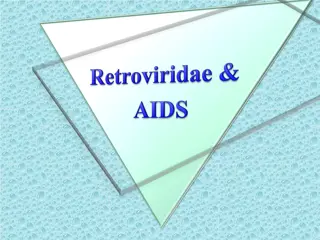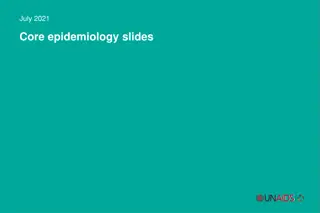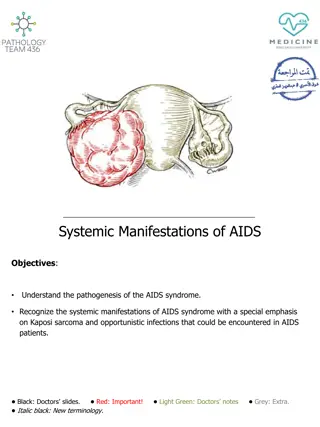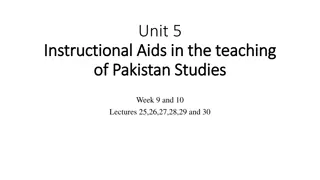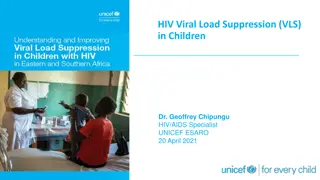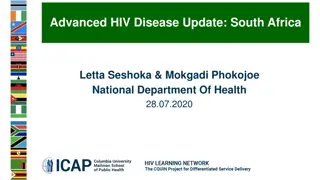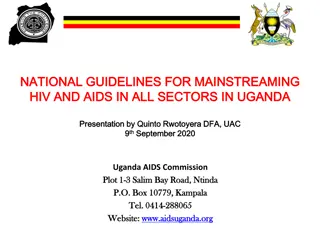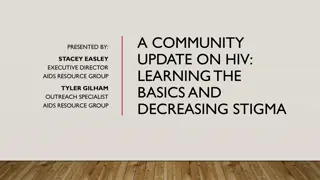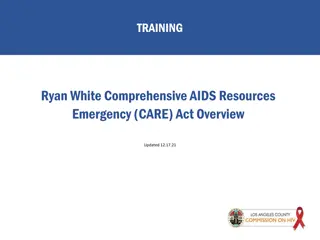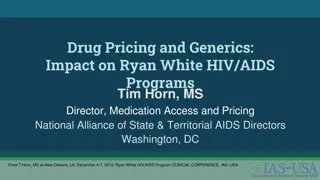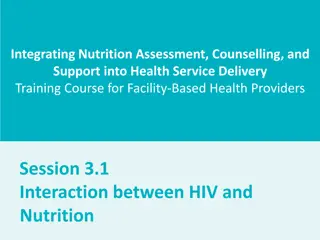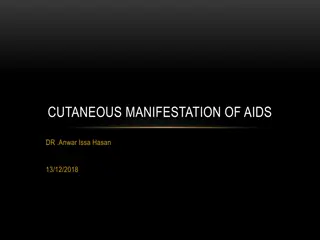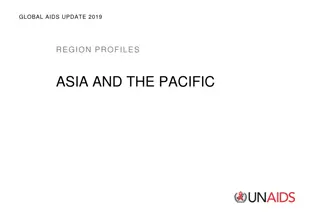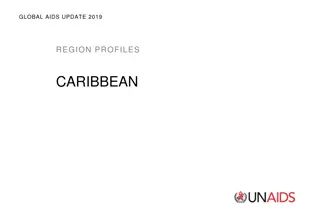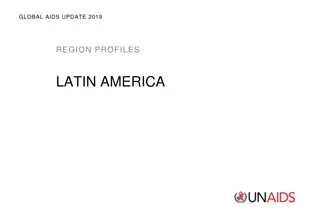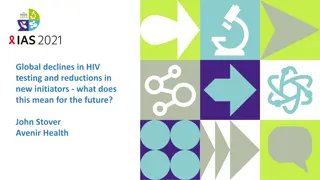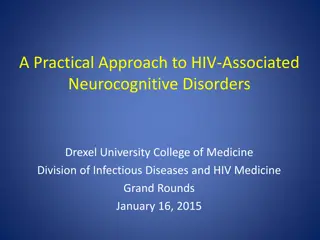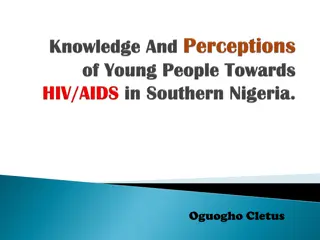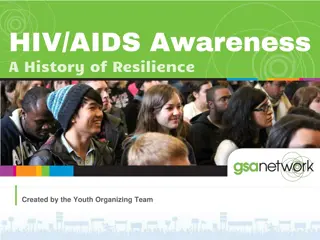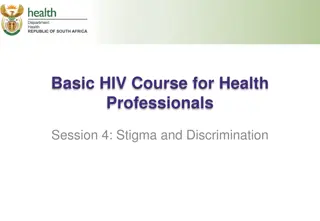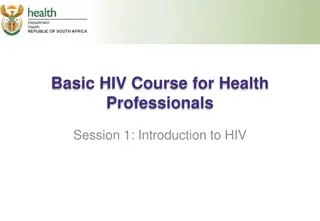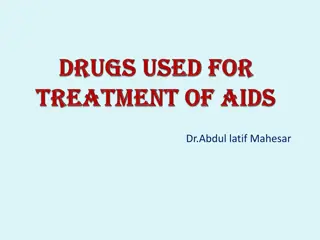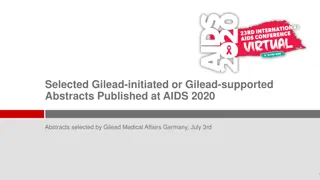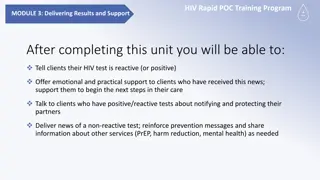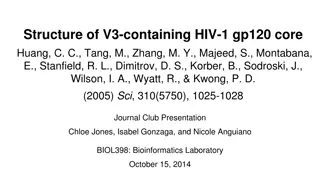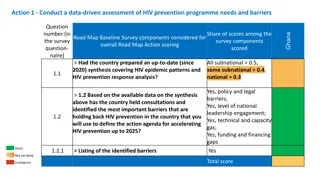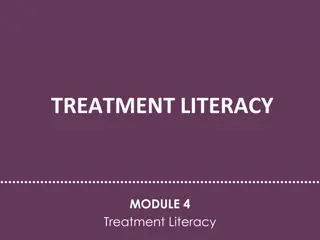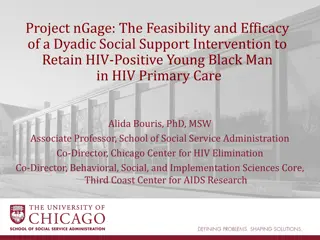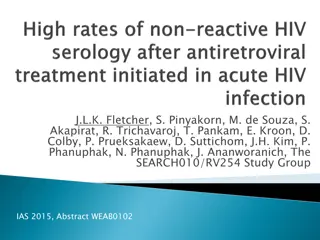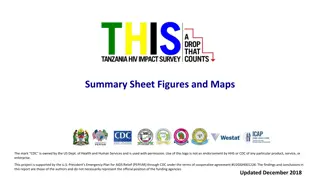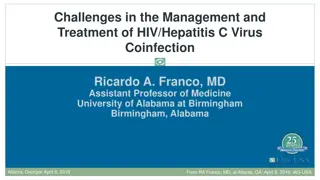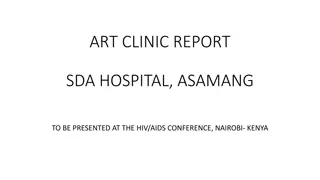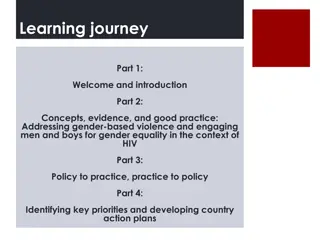Update on HIV and AIDS Prevention Guidelines 2022
This update highlights key points from the PMK No. 23/2022 on combating HIV, AIDS, and STIs. It covers terminologies, goals for eliminating HIV and AIDS by 2030, and strategies such as PrEP and PEP. The guidelines emphasize timely interventions like Post-Exposure Prophylaxis (PEP) and Pre-Exposure P
3 views • 38 slides
Understanding HIV and AIDS: Facts and Importance in Oklahoma
Explore essential information on HIV and AIDS, including transmission myths, definitions, the importance of people-first language, and statistics specific to Oklahoma. Learn about the impact of HIV/AIDS in the United States and why accurate understanding and language are crucial in addressing this p
3 views • 35 slides
Understanding the Differences Between HIV and AIDS, Importance of Prevention
HIV and AIDS are closely related, with HIV being the virus that leads to AIDS. HIV weakens the immune system by attacking specific white blood cells, while AIDS is the advanced stage of HIV infection. Prevention is crucial as AIDS is a deadly, incurable disease. The transmission of HIV primarily occ
4 views • 14 slides
Human Immunodeficiency Virus
HIV, a member of the lentivirus subfamily of retroviruses, causes Acquired Immunodeficiency Syndrome (AIDS). HIV-1 and HIV-2 have distinct characteristics, with HIV-1 being global and HIV-2 primarily in West Africa. The virus encodes reverse transcriptase and has an envelope containing glycoproteins
1 views • 31 slides
Global Overview of the AIDS Epidemic in 2020
The global AIDS epidemic in 2020 saw 37.7 million adults and children living with HIV, with 1.5 million new infections and 680,000 AIDS-related deaths. Africa remains heavily affected, with 60% of new infections occurring in sub-Saharan Africa. The data highlights the continued challenges in combati
2 views • 11 slides
Understanding Systemic Manifestations of AIDS
Human Immunodeficiency Virus (HIV) is a retrovirus causing Acquired Immunodeficiency Syndrome (AIDS). HIV leads to immune system destruction, making individuals vulnerable to opportunistic infections and tumors. Common sexually transmitted diseases like syphilis, chlamydia, and gonorrhea are discuss
6 views • 15 slides
Utilizing Instructional Aids in Teaching Pakistan Studies: Enhancing Learning Through Visual and Audio-Visual Materials
Learning and teaching in Pakistan Studies involve the use of instructional aids such as visual aids, audio aids, and audio-visual aids to enhance the teaching-learning process in schools. These aids help in¡n reinforcing knowledge, stimulating sensory organs, and facilitating quick comprehension fo
0 views • 26 slides
Adventist AIDS International Ministry in Malawi - Providing Hope and Support
Adventist AIDS International Ministry (AAIM) in Malawi is dedicated to helping those affected by HIV/AIDS through various programs and collaborations. The ministry involves church ministries, collaborations with organizations like ADRA Malawi and the Malawi government, and runs multiple HIV/AIDS pro
4 views • 11 slides
Addressing Viral Load Suppression in Children with HIV: Insights and Recommendations
This study led by Dr. Geoffrey Chipungu, an HIV/AIDS Specialist at UNICEF ESARO, explores the rates, trends, and factors associated with HIV viral load suppression (VLS) in children. The research reveals sub-optimal VLS rates in children compared to adults, highlighting the need for improved policie
5 views • 12 slides
Update on Advanced HIV Disease in South Africa
Update on advanced HIV disease in South Africa highlights progress in reducing AIDS-related deaths, prevalence rates, and advancements in coordinating and implementing policies and guidelines for HIV/AIDS response. The report covers statistics on HIV prevalence, ART facilities, mortality rates, and
0 views • 17 slides
Mainstreaming HIV and AIDS in Uganda: Guidelines and Initiatives
The presentation by Quinto Rwotoyera from Uganda AIDS Commission discusses the national guidelines for mainstreaming HIV and AIDS in all sectors in Uganda. The content covers the existing policy and guidelines, overview of the presidential FastTrack initiative, objectives of the guidelines, users of
0 views • 28 slides
Understanding HIV: Basics, Stages, and Treatment
HIV, Human Immunodeficiency Virus, attacks the immune system and can progress to AIDS if left untreated. Antiretroviral Therapy (ART) helps control HIV, allowing individuals to live healthy lives. The stages of HIV include Acute Infection, Chronic Infection, and the most severe stage, AIDS. Early de
0 views • 29 slides
Understanding Ryan White Part A/MAI Clients in Baltimore EMA
Detailed insights into the Ryan White Part A/MAI clients in the Baltimore EMA area, focusing on client-level data, demographics, housing status, and key statistics from FY2016. The mission and objectives outlined by the BCHD Ryan White HIV/AIDS Bureau to enhance the quality of life for individuals l
0 views • 24 slides
Overview of Ryan White CARE Act: 30 Years of Lifesaving Care for People Living with HIV/AIDS
August 18, 2020, marked the 30th anniversary of the Ryan White CARE Act, a landmark legislation that established the Ryan White HIV/AIDS Program providing care and treatment services to individuals with HIV in the U.S. The Act has been amended several times to extend and revise its purpose, no longe
0 views • 21 slides
Impact of Drug Pricing and Generics on Ryan White HIV/AIDS Programs
This presentation by Tim Horn, MS, delves into the effects of drug pricing and generics on Ryan White HIV/AIDS Programs, focusing on cost containment, program income, challenges with antiretroviral drug pricing, and the role of generic drugs in mitigating costs. The discussion also covers the 340B D
0 views • 31 slides
Understanding the Impact of HIV on Nutrition
This training session focuses on the relationship between undernutrition and HIV, discussing how HIV/AIDS affects nutrition among People Living with HIV (PLHIV). It covers the benefits of good nutrition for PLHIV and provides recommendations for Nutrition Assessment, Counselling, and Support (NACS)
1 views • 27 slides
Understanding Cutaneous Manifestations of HIV and AIDS
Human Immunodeficiency Virus (HIV) is a lentivirus that infects CD4 T lymphocytes, leading to Acquired Immunodeficiency Syndrome (AIDS). Cutaneous manifestations of HIV/AIDS vary depending on the stage of infection and CD4 T cell counts. Early signs include exanthem, oral hairy leukoplakia, candidia
0 views • 17 slides
Exploring the Use of PrEP to Reduce HIV Transmission Among African American Men
In response to the HIV/AIDS pandemic, this study focuses on the effectiveness of Pre-Exposure Prophylaxis (PrEP) in reducing HIV transmission among African American men who have sex with men in Orangeburg, SC. The research aims to investigate the impact of PrEP compared to condom use, and the necess
0 views • 6 slides
HIV Trends in Asia and the Pacific: Update 2019
The AIDS update for Asia and the Pacific region in 2019 reveals concerning statistics on new HIV infections, with a focus on young people and men who have sex with men. The data showcases regional profiles, prevalence rates, and incidence trends, shedding light on the challenges in combating HIV/AID
0 views • 21 slides
Global AIDS Update 2019: Caribbean Region Profiles
The Global AIDS Update 2019 provides an overview of the HIV situation in the Caribbean region, including statistics on new HIV infections, AIDS-related deaths, key populations affected, and interventions in place. The data reflects changes in HIV prevalence, incidence, and prevention efforts from 20
0 views • 17 slides
HIV/AIDS Update in Latin America: Trends and Key Findings
This update provides insights into the HIV/AIDS situation in Latin America from 2000 to 2018, covering aspects such as new infections, AIDS-related deaths, incidence-prevalence ratio, and key population demographics. The data reflects changes in policies, prevalence among key populations like sex wo
0 views • 17 slides
Impact of Global Declines in HIV Testing and Service Disruptions on Future Healthcare
Global declines in HIV testing and reductions in new initiators, coupled with disruptions in HIV services due to COVID-19, pose challenges for future healthcare. Short-term disturbances could lead to increased HIV-related mortality, emphasizing the need for program responses to mitigate adverse effe
0 views • 10 slides
Understanding HIV-Associated Neurocognitive Disorders: A Practical Approach
HIV/AIDS presents complex medical and psychiatric challenges, including HIV-Associated Neurocognitive Disorders (HANDs), which impact patients, families, and caregivers. This presentation by Dr. Mary Ann Adler Cohen provides insights into the prevalence, impact, diagnosis, and treatment of HANDs, em
0 views • 56 slides
Understanding HIV/AIDS Perceptions Among Young People in Southern Nigeria
The study focuses on examining perceptions and attitudes towards HIV/AIDS among young individuals in Southern Nigeria. It analyzes the level of awareness, knowledge, and potential relationships between HIV/AIDS knowledge and sexual behavior. The aim is to gather insights to shape effective HIV/AIDS
0 views • 25 slides
Empowering Youth: HIV/AIDS Awareness and Activism
Explore the history of HIV/AIDS activism, access community care and resources, and embrace self-love with wellness tips. Engage in discussions on safeguarding against HIV/AIDS and promoting prevention. Discover the importance of chosen family in finding acceptance. Join the movement to protect yours
0 views • 24 slides
Understanding HIV-Related Stigma and Discrimination
This session covers the definition and types of stigma and discrimination related to HIV/AIDS, along with the impact on people living with HIV/AIDS (PLWHA). Participants will also learn strategies to address stigma and its effects on prevention and treatment efforts, emphasizing the need to combat s
0 views • 10 slides
Basic HIV Course for Health Professionals Session 1: Introduction to HIV
This session introduces basic epidemiological concepts, differentiates between HIV and AIDS, explains the HIV life cycle, and discusses how HIV is transmitted. Definitions of key terms like prevalence, incidence, mortality rate, and morbidity are provided. The session also highlights the differences
0 views • 30 slides
Understanding HIV and AIDS: Treatment and Progression
HIV leads to AIDS, a progressive immune system failure allowing life-threatening infections. Effective drugs can extend life by maintaining the immune system and preventing opportunistic infections. Various types of anti-retroviral drugs target different viral components to reduce viral load and mai
0 views • 29 slides
Selected Gilead Abstracts Published at AIDS 2020
The abstracts selected by Gilead Medical Affairs Germany for AIDS 2020 cover a range of topics related to HIV treatment and research. Topics include safety and efficacy of B/F/TAF in older adults, real-world effectiveness of B/F/TAF in clinical practice, prevalence of resistance in PLWH, and the lat
0 views • 13 slides
HIV Rapid POC Training Program - Delivering Results and Support
In Module 3 of the HIV Rapid POC Training Program, you will learn how to handle delivering reactive (or positive) HIV test results to clients. It covers providing emotional support, discussing next steps in care, notifying and protecting partners, and reinforcing prevention messages. The module emph
1 views • 13 slides
Understanding the Role of V3 Region in HIV Entry to CD4 T-Cells
The V3 region of gp120 plays a crucial role in HIV entry to CD4 T-cells by determining the coreceptor usage. Studies focus on the structural aspects of V3, its conservation, coreceptor binding, and antibody accessibility. The HIV envelope structure, including trimeric spikes with gp120 and gp41 glyc
0 views • 24 slides
Assessment of HIV Prevention Programme Needs and Barriers in Ghana
Conduct a data-driven assessment of HIV prevention programme needs and barriers in Ghana based on the Ghana Road Map Baseline Survey components. Evaluate the country's preparedness in addressing HIV epidemic patterns and prevention response analysis. Identify key barriers hindering HIV prevention ef
0 views • 11 slides
Understanding HIV and AIDS: The Progression in Adult Natural History
HIV infection progresses in stages from acute infection with flu-like symptoms to a latency period of no symptoms, then advancing to AIDS where the immune system is significantly weakened, leading to opportunistic infections and HIV-related cancers. The virus targets CD4 cells, impacting the immune
0 views • 29 slides
Project nGage: Dyadic Social Support Intervention for HIV-Positive Young Black Men
Research led by Alida Bouris focuses on the feasibility and efficacy of a dyadic social support intervention to retain HIV-positive young Black men in HIV primary care. Supported by the National Institute of Mental Health, the project aims to enhance engagement in care and improve health outcomes th
0 views • 45 slides
Prospective Cohort Study on Acute HIV Infection in Bangkok
The study focuses on initiating combination antiretroviral therapy for all HIV-infected individuals to preserve the CD4+ T cell population, restrict viral reservoir seeding, and minimize viral evolution. Rapid suppression of HIV viraemia in patients could lead to potential candidates for future cure
0 views • 12 slides
HIV Project Summary Sheet and Figures
HIV Project Summary Sheet and Figures include data on HIV prevalence by age and sex, viral load suppression among people living with HIV, achievement of the 90-90-90 goals, and more. The project is supported by the U.S. President's Emergency Plan for AIDS Relief (PEPFAR) through the CDC. Findings an
0 views • 7 slides
Challenges in the Management and Treatment of HIV/Hepatitis C Virus Coinfection
This presentation by Dr. Ricardo A. Franco focuses on the challenges faced in managing and treating patients with HIV/Hepatitis C virus coinfection. It discusses the burden of HCV mono-infection and HIV/HCV co-infection, the impact of HIV co-infection on survival in HCV-related cirrhosis, and the ro
0 views • 26 slides
Breaking Barriers: Understanding U=U in HIV Prevention
The concept of Undetectable=Untransmittable (U=U) has reshaped how we approach HIV prevention, with evidence emphasizing viral load as a key factor in transmission risk. Landmark studies like the Partner Study and HPTN 052 have solidified the U=U message, showcasing significant reductions in HIV tra
0 views • 28 slides
HIV/AIDS Clinic Report at SDA Hospital, Asamang - Presented at Conference
The ART Clinic at SDA Hospital in Asamang, Kenya, is dedicated to providing care and treatment for HIV/AIDS patients. With a focus on HIV testing, counseling, psychological support, and providing ART drugs, the clinic aims to achieve the 90-90-90 target by 2030. Through key activities like the Know
0 views • 20 slides
Understanding Gender-Based Violence, HIV, and Engaging Men for Equality
Exploring the intersection of gender-based violence, HIV, and the involvement of men and boys in achieving gender equality is crucial for a sustainable response to HIV and AIDS. Addressing harmful gender norms, inequality, and violence is essential for effective HIV prevention, especially in key pop
0 views • 7 slides



